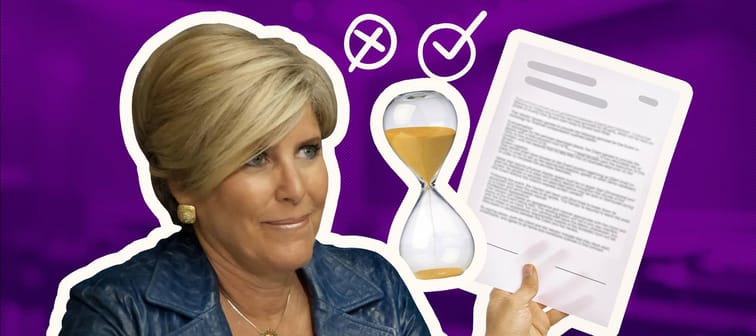1. Don't retire too early
On a recent edition of the podcast Afford Anything, Orman was asked what she thought of the FIRE movement. That's FIRE as in "financial independence, retire early."
Her blunt response — “I hate it. I hate it. I hate it. I hate it." — set off a firestorm among the FIRE faithful.
But she explained that it would take a lot of money to make retirement work at, say, age 35.
"You need at least $5 million, or $6 million," she said. "Really, you might need $10 million." In her opinion, anything less wouldn't offer you enough protection from a potential financial catastrophe, like an expensive illness.
"You will get burned if you play with FIRE," Orman told her interviewer.
Orman reminded her readers in a June 2022 blog post that there are “no loans for retirement,” so it is key that you save enough for the retirement life you want.
“Without the money you need, your adult kids may need to step in and help. They will do that without question, out of love. But you and I both know it will be a burden you don’t ever want to impose.”
Meet Your Retirement Goals Effortlessly
The road to retirement may seem long, but with WiserAdvisor, you can find a trusted partner to guide you every step of the way
WiserAdvisor matches you with vetted financial advisors that offer personalized advice to help you to make the right choices, invest wisely, and secure the retirement you've always dreamed of. Start planning early, and get your retirement mapped out today.
Get Started2. Don't go without a will
"Do you have your estate planning in place? If not, you might want to think again," Orman writes on Oprah.com.
While everybody needs a will, most Americans don't have one and lack other important end-of-life documents, including a revocable living trust.
That's a legal arrangement that holds your property while you're alive and transfers it to your heirs after your death, without the complicated process known as probate.
According to a June episode of Suze Orman’s podcast, there is another reason to set up a living trust: an incapacity clause.
“In case you are incapacitated, you get sick, then you've named somebody as successor trustee to pay your bills, to disperse money to take care of you. … A will only goes into effect if you have died.”
Orman says to set up a revocable living trust for passing down your house and other major assets, and draw up a will for your other special possessions, like great grandma's wedding ring or your first-edition book collection.
3. Don't take out a reverse mortgage in your 60s
A reverse mortgage is a type of home equity loan for seniors that allows you to receive the money as a lump sum or in monthly installments.
The loan is repaid, with interest, when you die or sell the house.
You can take out a reverse mortgage starting at age 62, but Orman says that's risky.
In her view, it's best to treat a reverse mortgage as a last resort for emergency money, and to wait as long as you possibly can before going that route.
"If you tap all your home equity through a reverse at 62 and then at 72 you realize you can’t really afford the home, you will have to sell the home," she says.
Trade your favorite stocks any time
Investing doesn't have to be hard. Robinhood is the only place you can trade stocks, options and ETFs 24 hours a day, 5 days a week, all still commission-free. Start building your portfolio with as little as $1.
Get Started4. Don't miss out on matching money
If you have a 401(k) or other retirement plan through work, don't leave free money on the table.
Make sure you're putting enough in so that you'll receive the full matching contribution from your employer.
Orman says your company might kick in 50 cents for every dollar you contribute, up to 6% of your salary.
"Under those terms, if the employee contributed $3,000, the employer would kick in another $1,500," she says on Oprah.com. "Hello! That's a guaranteed 50% return on your investment."
So raise your paycheck contributions and start maxing out the match today.
5. Don’t retire owing money on your home
A survey from mortgage banker American Financing found that 44% of Americans in their 60s and 70s are still paying off a mortgage. And 17% said they don’t expect to ever pay it off.
“This is so not OK,” Orman has blogged.
She urges people to go into retirement mortgage-free, for two reasons: to stretch their retirement savings and to rid themselves of debt — an albatross that affects even mental health.
“If you’re going to stay living in that house for the rest of your life, pay off that mortgage as soon as you possibly can,” Orman tells CNBC.
Without a mortgage, you'll have more financial security in retirement, she says. So work until you're 70, use excess emergency savings and do whatever else it takes to get that house debt paid off.
Sponsored
Meet Your Retirement Goals Effortlessly
The road to retirement may seem long, but with WiserAdvisor, you can find a trusted partner to guide you every step of the way
WiserAdvisor matches you with vetted financial advisors that offer personalized advice to help you to make the right choices, invest wisely, and secure the retirement you've always dreamed of. Start planning early, and get your retirement mapped out today.







